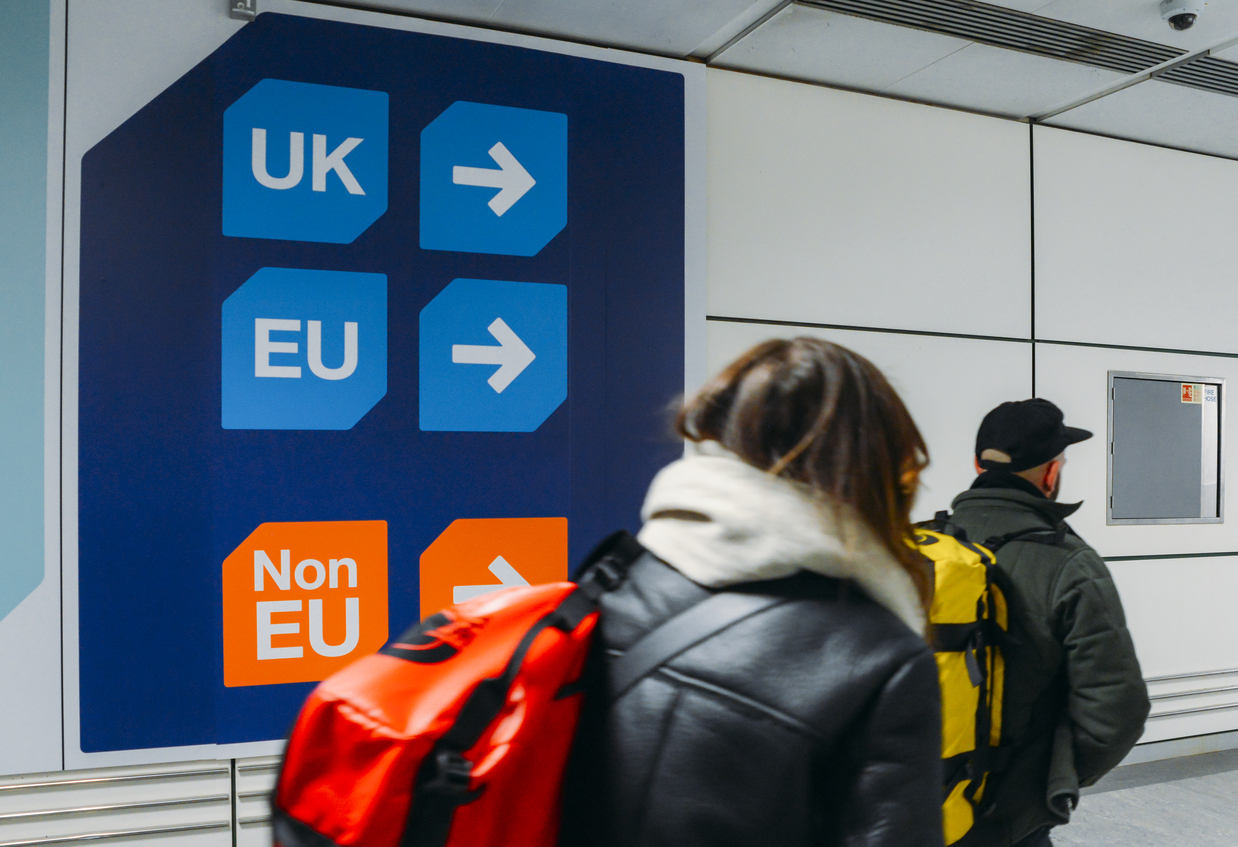“But the eVisa system is deeply flawed,” Andreea Dumitrache, CEO of the3million, a grassroots group of EU citizens in the UK, told Big Issue. “A rushed change risks jeopardising the rights of more than four million people and unfairly subjecting them to the hostile environment, despite having physical immigration documents and having called the UK their home for years.”
Parallels between eVisas and the Windrush scandal
Maram Shiba is a 22-year-old living in Reading who came to the UK from Yemen in 2019 as a student. Her father is British and she eventually received her family visa, which gave her leave to remain in the UK until December 2026.
In August, after a month of travelling, she tried boarding a plane in Saudi Arabia to Cairo, to then travel back to the UK. At the time, she carried her BRP – due to expire on 31 December of this year – but she did not have an eVisa as she hadn’t been invited to apply for one by the Home Office.
“The flight operatives assumed my visa ended on 31 December,” she told Big Issue. “Egypt requires Yemeni nationals to have at least six months of valid UK residency to be granted entry. I explained the UK had changes its laws and that my visa is valid until 2026, but they refused to believe me. I was denied boarding and lost the cost of my flight back.”
She scoured the internet and found that the Home Office was no longer inviting people to create an eVisa, instead requiring people to initiate the process themselves. She quickly went about applying for one.
“I was scared, worried and furious. I did not know what to expect and did not feel secure in my legal documents as they were denied credibility. I also struggled to access the website as the airport internet was not working and my roaming had finished. I lost money, time and was almost stranded abroad.”
Advertising helps fund Big Issue’s mission to end poverty
Josephine Whitaker-Yilmaz at migrant and refugee charity Praxis says the prospect of digital exclusion for many has parallels with the Windrush scandal.
“With Windrush, people with a right to be here were unable to prove it because the Home Office changed the rules and didn’t take into account the effects on racialised communities,” she said. “With the eVisa situation, you’ll have people who have leave to remain unable to get a job, house, or benefits because they don’t have an eVisa account. As with all aspects of the hostile environment, this is likely to hit people of colour and vulnerable groups hardest.”
Get the latest news and insight into how the Big Issue magazine is made by signing up for the Inside Big Issue newsletter
The digital-only immigration system isn’t new – EU citizens were the ‘guinea pigs’ post-Brexit. Dumitrache says she has been raising concerns about the system since 2018.
“EU citizens and their family members continue to report problems to us which severely affect their ability to operate properly in the UK and prove their rights,” she says. “There remains a clear lack of joined-up thinking and an unwillingness on the part of government to properly assess what the shortcomings are of the current system. We have raised these concerns repeatedly, but there have been very few changes.”
Kira, who has asked for us not to use her real name, moved to the UK from Russia in 2017 on a student visa, receiving Indefinite leave to remain in June 2024. She recently lost out on her “dream job” thanks to the transition to eVisas.
Advertising helps fund Big Issue’s mission to end poverty
After two interviews, the employer made her a job offer and asked for her share code, generated online after obtaining an eVisa, to finalise everything. “When I tried to generate the share code, the system had my name and birthdate, but it displayed my husband’s photo,” she said.
A series of other Home Office errors led to the employer losing confidence in her immigration status. She ended up not being able to take the job.
“This experience made me feel like I was nobody, like an invisible person without any status in the UK,” she said. “After receiving my indefinite leave to remain [and spending over £10,000 on it], I was elated. And yet after all that effort, I felt I had no legal standing. I cried for two days without stopping, feeling betrayed. I had invested so much time, money and effort into becoming a good member of society, only to feel like I was no one.”
‘This will hugely hinder a refugee’s ability to function on a day-to-day basis’
The people most impacted by this switch will no doubt be those who are digitally excluded.
“Many vulnerable people won’t have access to, or skills to use, technology, so they cannot take the first step of creating an account,” Dumitrache said. “Even those who will get help from charities won’t be able to use it effectively every time they need to prove their rights – when applying for a job, renting a home, travelling, or maintaining their bank account.”
Nick Beales works for the charity Ramfel supporting migrants who can’t afford legal advice.
Advertising helps fund Big Issue’s mission to end poverty
“Many of the people we support have no idea about the need to apply for eVisas, and this is especially problematic for those who are elderly and/or digitally excluded,” he said. “For refugees, who often do not speak English or know where to access information if newly arrived, there are real concerns that they will be unable to secure eVisas and be unable to evidence their status. This will hugely hinder their ability to function on a day-to-day basis, in turn undermining their prospects of swiftly establishing themselves in the UK.”
Ramfel staff hosted a drop-in for service users to create eVisas with support workers present to help, but the Home Office systems failed and they were only able to secure an eVisa for the first person they saw. Beales is afraid that over the next few weeks, prior to the 31 December cut-off, there will be much of the same chaos “with people unaware of the need to secure eVisas and then scrambling desperately to try and access advice and information”.
He added: “This is especially so for vulnerable people, such as older people and those with serious health conditions, and we are really concerned about people being denied basic rights when the government has not issues them their eVisas.”
Despite this, the Home Office insists up to £4m has been provided to a number of UK-wide organisations to help vulnerable people to make the transition to eVisas.
Dumitrache says the Home Office should allow physical documents to be used during the transition phase, offer a free telephone helpline and accept liability when things go wrong.
“However, ultimately what people need is reliable proof of their immigration status,” Dumitrache concluded. “There needs to be constructive and meaningful engagement with civil society on developing a better form of digital status which is not dependent on live access to Home Office databases and systems, and which allows for physical backups.”
Advertising helps fund Big Issue’s mission to end poverty
A spokesperson for the Home Office told Big Issue that eVisas bring “significant benefits”.
“They cannot be lost, stolen or tampered with, unlike a physical document, and also increase the UK immigration system’s security and efficiency,” they said. “We are committed to supporting vulnerable people switching to and navigating this change. We have provided clear guidance and an extensive range of support for vulnerable and less digitally confident people.”
Government guidance can be found online.
Do you have a story to tell or opinions to share about this? Get in touch and tell us more. This Christmas, you can make a lasting change on a vendor’s life. Buy a magazine from your local vendor in the street every week. If you can’t reach them, buy a Vendor Support Kit.









